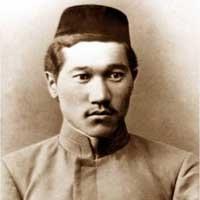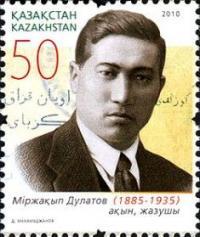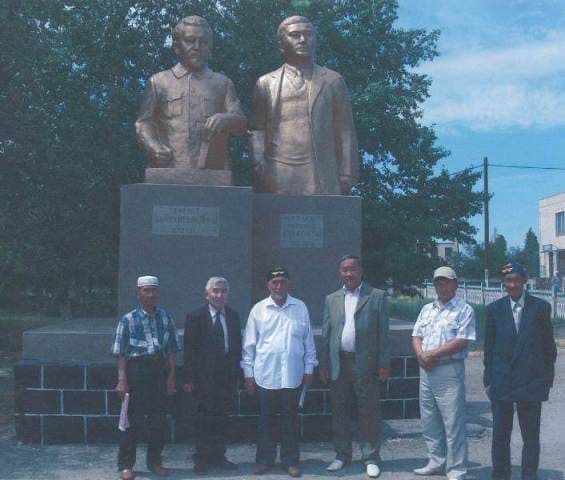You are here
Dulatov Myrzhakyp (1885 - 1935).


Turgai sights Tour.
"Who is timid by nature, he not only himself will not perform any brave deeds, but also instill fear in his comrades."
Thomas More, "Utopia"
Cultural walks in Kostanai.
Dulatov Myrzhakyp (Mir-Yakub) - a great poet, writer, publicist, educator-teacher, entered the three together with A. Bukeikhanov and Akhmet Baitursynov, which marked the milestone of the revival of the national identity of the Kazakhs in the XXth century.
He was born on November 25, 1885 in the village of Sarykopa, Kustanai region. In his brief description of his childhood he wrote: “I come from the Middle Horde, the Argyn clan, 2 years old I lost my mother, 12 years old my father.
When I was 8 years old, my father sent me to study as an aul mullah, an extremely ignorant person. I don’t remember how long I studied with him, I only know that apart from memorizing Arabic prayers I learned nothing ”.
Then he studies for two years in a rural school in Russian and Kazakh languages, for another two years in a Russian-Kazakh school and receives the title of a teacher in a rural school. Taught aul children. He devoted his leisure hours to self-education, read books by Kazakh, Russian, European and Eastern authors a lot and eagerly.
The first poetic experience was published in the first issue of the Kazakh newspaper "Serke" in St. Petersburg. "Serke" is a strange name for the Russian ear and familiar to the Kazakh, who longed in a city chained in granite across the free steppe expanses: serke is a leader who leads a lost sheep flock into a blizzard on the road. Myrzhakyp Dulatov publishes a passionate poem "To the Youth" in Serka.
The first collection of poems "Oyan, Cossack", was published in 1909, immediately sold out and was republished in 1911. The title of the book served as a manifesto, an appeal to the people of that generation of intellectuals of the early twentieth century, one of the leading inspirers of which Myrzhakyp Dulatov is rightfully considered.
In 1911, the collection "Oyan, Cossack" was confiscated, as the author himself noted, by the head department for press affairs. Smagul Sadvakasov in the preface to the book “Young Kazakhstan” (1928) wrote: “At the beginning of this century, the first followers of Abai appear. These include the living A. Baitursynov, M. Dulatov, M. Zhumabaev. The first novel in the Kazakh language called “Bakytsiz Zhamal” (“Unhappy Zhamal”) was published in 1910. Its author is the aforementioned M. Dulatov.
The novel describes the life of an oppressed Kazakh woman, sold as a thing, for kalym and was a huge success, bringing the author unprecedented fame. Dulatov attached great importance to the “Kazakh” newspaper, created, as he believes only thanks to the selfless work and skillful leadership of A. Baitursynov, which served as a social and political publication, and existed until October 1918 ”. He later devoted an essay to the life and work of A. Baitursynov (1922).
In 1911, Myrzhakyp also actively collaborated in the first Kazakh magazine, where his stories and poems appeared. In 1915, a collection of poems was published under the general title "Terme". After the October Revolution, M. Dulatov worked in various editions, continued to write, conceived work (remained unfinished) on the history of the Kazakh people.
In 1928 he was arrested, spent two years in prison, then was exiled to the Solovetsky camp, where he died on October 5, 1935. Four grandchildren (Dinar, Nurlan, Zhanat, Yerlan) are still alive, children of his daughter Gulnar, a doctor by profession.
The life and work of M. Dulatov are closely connected with the Alash party and the government of the Alash Horde. Thinking people, including M. Dulatov, could not stay away from the process of colonization, when at the behest of the tsarist administration, more than 1.5 million immigrants flooded into the region, to whom the best lands were transferred.
To get out of this situation, they considered it necessary to get rid of lack of culture, ignorance, complacency and obedience, to awaken in the people the desire for enlightenment, science, and enterprise. Here they were the successors of the XIXth century enlighteners.
While in prison under interrogation in 1929 in response to the accusation of "nationalism", he explained: "We want our fatherland to belong to us." M. Dulatov strongly opposed the reform of the Arabic alphabet, considering the language reform a means to break the ties of the people with its written history.
This will mark the beginning of the loss of their native language, the alienation of the people from their own history. He sharply felt the hypocrisy of the then declarations about the alleged "state status" of the Kazakh language and tried in every possible way to defend the rights of the Kazakh language and religion.
Even before the unrighteous trial, he did not bow his head and declared in his last official speech: “For the sake of the future of my people, I am obliged to do everything possible. If I am mistaken, then together with the people... Sooner or later, the truth will triumph. "
And today, having come to us again, Myrzhakyp Dulatov continues to stand on the positions of the working people. And now he will stay with him forever.

Authority:
http://www.tarih-begalinka.kz/ru/history/revolution/figures/zhangeldin/







